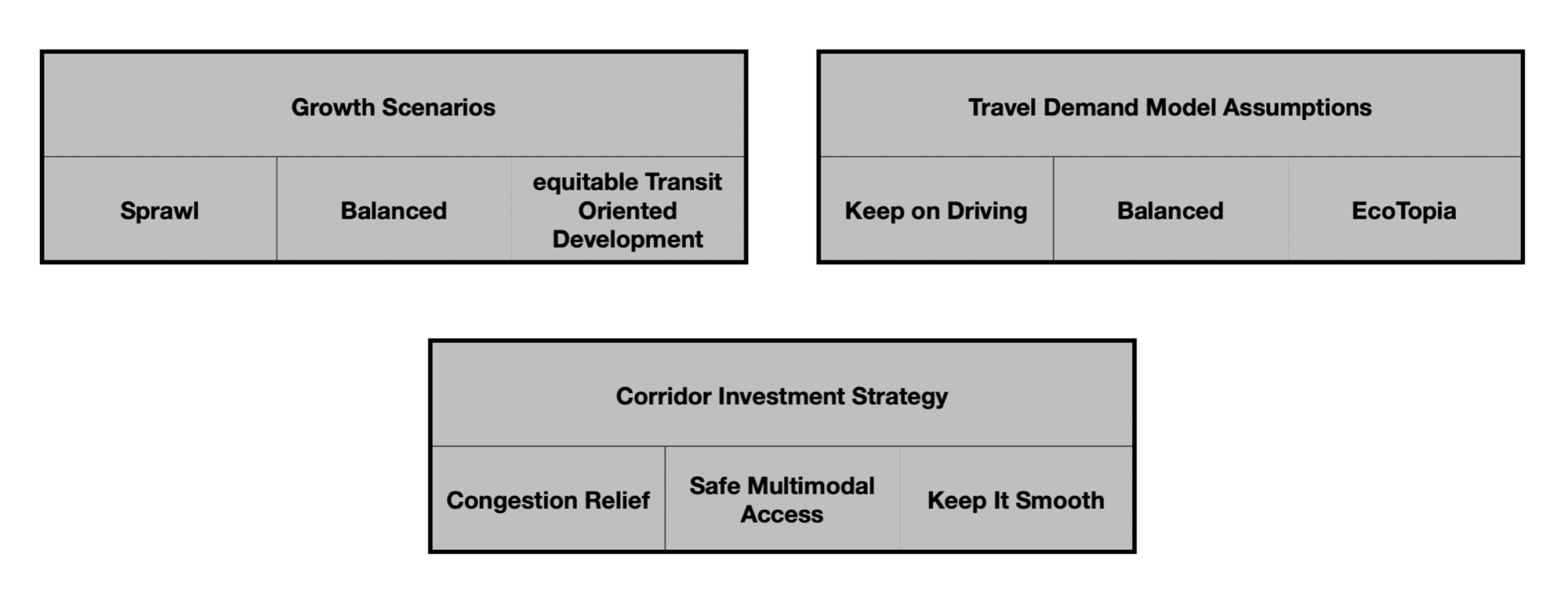On Thursday, September 3, 2020, we started a two-part series on Scenario Planning for Texas MPOs. Next month’s Policy Hacking, our monthly meetup, will continue this discussion, but with a panel of guests representing many different points of view on how to fix the I-35 and I-45 corridors in Austin and Houston.
September 3, 2020 Policy Hacking Meetup
Download the presentation as a pdf (65 MB)
This month, we begin a two part series looking at how our regional governments (Metropolitan Planning Organizations (MPOs)) plan for our future, and how we could improve that process.
Shifting from politically-driven growth forecasts to scenario planning processes can equitably engage the people of a large metropolitan region, and provide for better outcomes for the economy, environment, and health of the region.
For the October 1st event, we are inviting experts across the ideological / policy spectrum to explore scenarios for the future of the I-45 corridor in Houston and the I-35 corridor in Austin, two of the biggest transportation / urban planning projects in Texas.
Register here for the October 1 (6-8pm) meeting.
Scenario Planning for Texas MPOs
Creating better growth forecasts and models for Regional Transportation Plans (RTPs) can help us create a better vision of the future. One method to do this is by using Scenario Planning, a process of considering a variety of scenarios for how growth is most likely to progress and meaningfully entertaining different solutions to address potential future scenarios.
The Federal Highway Administration (FHWA) encourages MPOs to adopt Scenario Planning throughout their processes, as a way to more equitably fulfill the role of regional planning for millions of residents, and to build resiliency in the regional strategy of transportation and land use planning.

The preceding chart is from the FHWA report “Supporting Performance-Based Planning and Programming through Scenario Planning” (pdf) published in 2016. This is part of a series of reports and presentations the FHWA has produced in the last decade to help lead MPOs and State Departments of Transportation to more equitable, resilient long term planning processes.
One of Farm&City’s four major programs, 50 Million Texans, focuses on metropolitan regional planning in Texas. We seek to empower more Texans to engage in the MPO processes that dictate so much about our lives. We have focused initially on the Austin region, with a series of reports intended to help with the regional planning efforts at the Capital Area Metropolitan Planning Organization and local land use planning efforts like Austin’s Land Development Code reform movement.
Earlier this year, we heavily engaged with the CAMPO 2045 RTP process, resulting in the following report that proposes new ways of more equitable, sustainable regional transportation planning for the 2 million people of the Austin region – going on 4 million.
Allocation Game: The Regional Growth Forecasts in the CAMPO 2045 Regional Transportation Plan (pdf)
Over this last summer, we worked with our four summer interns to develop more robust proposals for how Texas MPOs can use Scenario Planning to improve outcomes for our communities and economies. A new report should be finished in time for the October meeting.
Further interesting sources we have found in this process:
TXDOT Houston has developed Scenario Planning software, the Sustainable Ways to Integrate Future Transportation (SWIFT) Study, as presented at the July meeting of the Houston – Galveston Area Council (H-GAC) Transportation Policy Council (TPC) (video archive).
Scenario Planning for Cities and Regions: Managing and Envisioning Uncertain Futures is a very accessible and comprehensive textbook on this field by Professor Robert Godspeed from the University of Michigan’s Taubman College of Architecture and Urban Planning.


Pingback:Policy Hacking I-35 & I-45 in ATX & HOU – Farm&City
Pingback:El Paso City, County and MPO commit to Vision Zero – Farm&City